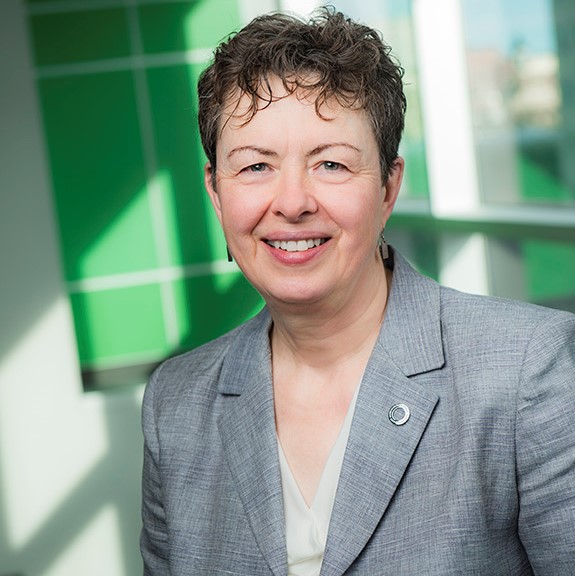Pandemic Perspectives: Dr. Carole Estabrooks
22 September 2020

Dr. Carole Estabrooks will provide her expertise in the online panel discussion event “Pandemic Perspectives – What we’ve learned from COVID-19” on Sept. 23. Photo: Laughing Dog Photography
Dr. Carole Estabrooks — professor and researcher at the University of Alberta, Faculty of Nursing and Tier 1 Canada Research Chair in Knowledge Translation — has always been a vocal advocate for better care of Canada’s senior citizens. Unfortunately, outdated long-term-care facilities, inadequate staff, and a poor quality of life are often overlooked issues— until COVID-19 shone a spotlight on them.
Since then, Estabrooks has spoken out on radio broadcasts, local and national news appearances and various podcasts — urging for a swift overhaul to Canada’s long-term-care system. She will provide her expertise in the online panel discussion event “Pandemic Perspectives – What we’ve learned from COVID-19” on Sept. 23. Estabrooks offers a preview of her approach in the Q&A below.
What has been your perspective in approaching the COVID-19 pandemic?
I am primarily a research scientist and my role during the pandemic has been in Long-Term-Care (LTC) research and synthesis of the causes of the high levels of COVID deaths in LTC in Canada relative to other countries. I have been approaching it with a sense of urgency because the death toll and the suffering [in Canada] have been so high. Many of us in the LTC field are concerned that the window for opportunity for change in LTC may be short-lived.
How has COVID-19 changed your professional life?
Quite dramatically, I don’t think I have ever been busier or worked with so many colleagues in such a short period of time – all focused on the same goals in a manner that is unusual to see.
What, if anything, would you say you learned during the pandemic?
How deep the attitudes toward aging and the work of women (which is largely caregiving) really are, which enabled the current situation to emerge and make it difficult to effect change - to find the necessary resources. Aging, dementia and LTC have a particularly disproportionate impact on women and that message has been challenging to get front and centre. But we have persisted in doing just that.
What is something from this pandemic that has surprised you?
The proportion of country-level COVID deaths to LTC COVID deaths in Canada are the highest in the world by a large margin sitting at about 80%. This suggests we did reasonably well at the population level but failed in a striking way in LTC homes.
If you could go back in time and give yourself one piece of advice at the start of the pandemic, what would it be?
Pace yourself, at the beginning even though we knew it was not going to be a short-haul, I think we did not factor in just how long and protracted this would be. The needs in LTC are urgent and unrelenting, grant opportunities rapidly increased, the need to disseminate was high. Since most of us continue remote work, that creates both new opportunities and new learning curves and new forms of work challenge
What’s one thing you want people to know moving forward, or for the next pandemic?
That pandemics and other major catastrophes and events always affect the vulnerable, the marginalized, those without voice or without power the hardest: the old, the poor, indigenous populations, the incarcerated, children. How we look after those groups is a reflection of how we are judged as a country — right now it does not seem that we are doing very well.
What can people expect from you at the panel?
A clear and cogent laying out of the issues and the necessary solutions as well as the urgency of the situation and how deeply rooted it is in our values about older Canadians.
Pandemic Perspectives — What we learned from COVID-19
Wednesday, September 23 | 7 - 8:30pm (MDT)
Registration: https://bit.ly/34yNaSm
Panelists:
Carole Estabrooks, Faculty of Nursing. '87 MNurs, '97 PhD
Dean Eurich, School of Public Health. '03 MSc, '07 PhD
Lynora Saxinger, Faculty of Medicine & Dentistry
Lorne Tyrrell, Faculty of Medicine & Dentistry. '64 BSc, '68 MD
Moderator: Lawrence Richer, Faculty of Medicine & Dentistry. '92 BSc(Hons), '96 MD, '09 MSc